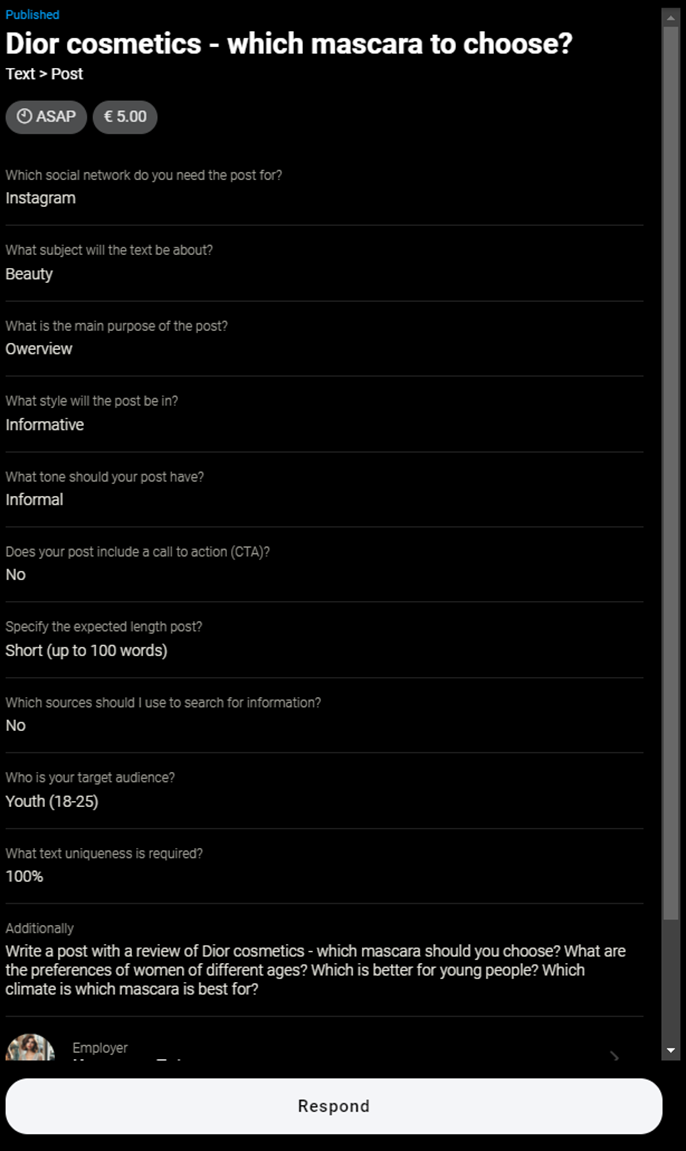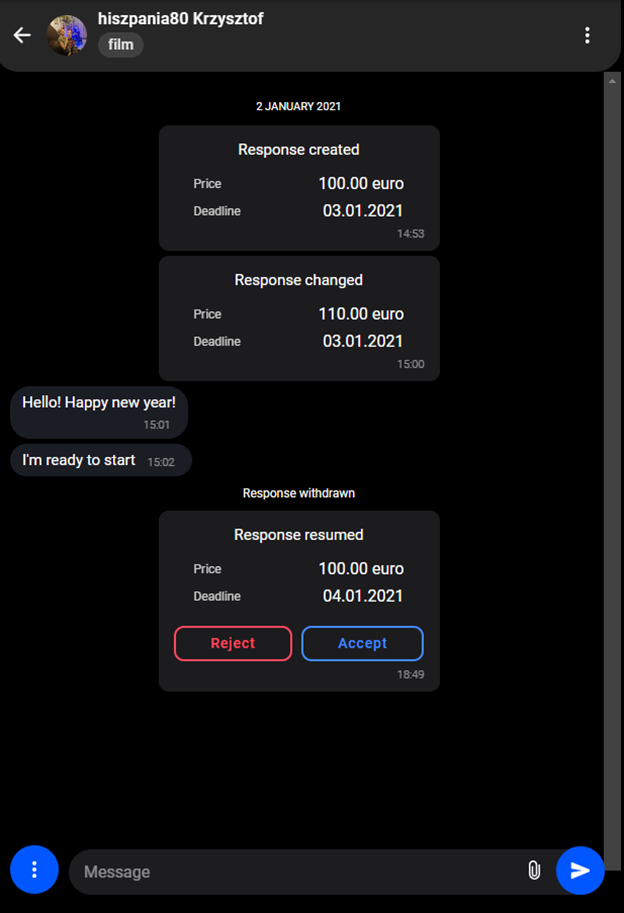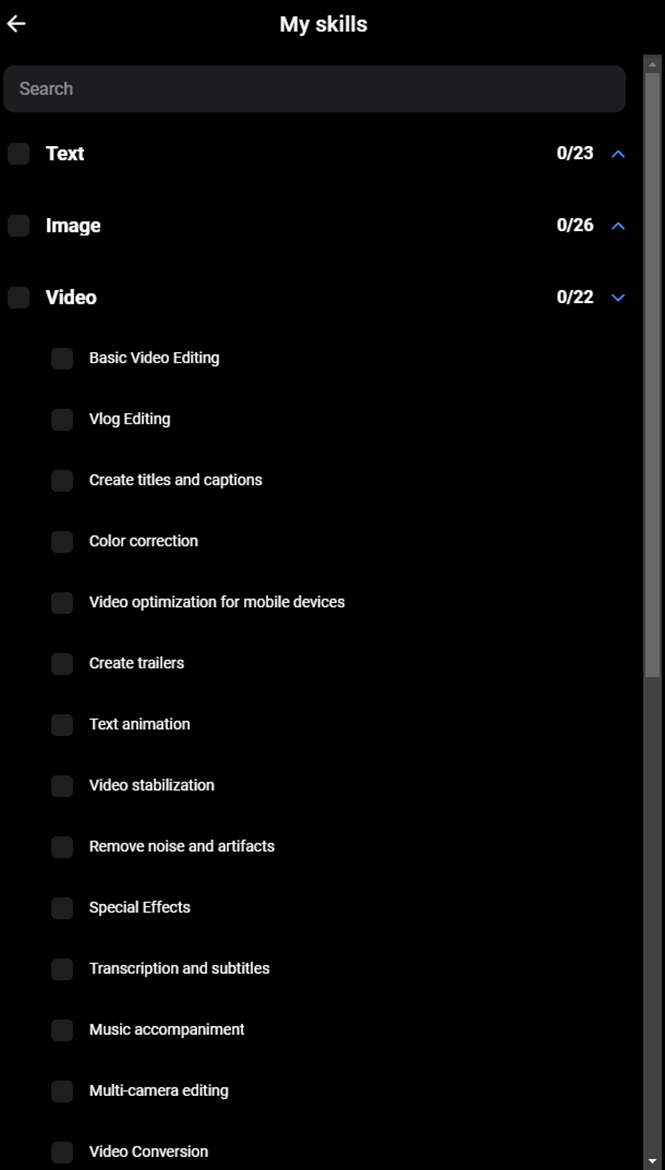Introduction
In an era of rapid digital technology development and digital economy expansion, the importance of innovative approaches in education, science, and professional activities becomes evident. Effective technological solutions can radically change conventional methods of work, learning, and scientific research, making them more accessible, convenient, and economically viable. Freelance platforms, one of the most dynamically developing directions in the modern economy, represent an interesting object for the introduction of new technological solutions aimed at improving and optimizing interactions between clients and freelancers.
One of the promising tools in this area is the Pyjam app, which integrates smart contract mechanisms for secure transactions and a briefing system to automate ordering and execution processes. These technologies not only speed up the process of preparing specifications and concluding contracts but also significantly increase their reliability and security. Smart contracts, in the context of this application, are not tied to blockchain technologies but represent advanced algorithmic solutions for automatic processing of contractual relationships and transactions, making their application universal and in demand in the modern freelance market [2].
This article is dedicated to analyzing the technical features of the Pyjam app and its role in advancing innovations in freelance services. The main focus is on smart contract mechanisms and the briefing system as key elements that contribute to optimizing processes and enhancing the efficiency of order execution on the platform. The goal of the article is to explore how these technological solutions can meet the current challenges of the 21st century in the fields of science, education, and innovation.
System Architecture
The Pyjam app is developed as a centralized solution that facilitates interaction among all users (clients and freelancers) through a single platform. The system architecture is built on a client-server model, where the web interface or mobile app acts as the client, and the server processes requests, manages data, and coordinates interactions [9].
Key components of the system include:
- Frontend, developed using Angular, provides a dynamic and adaptive user interface.
- Backend, implemented using PHP and NestJS, ensures the application logic and API interfaces for interaction with the frontend.
- Database, managed using MySQL, stores all information about users, orders, transactions, and briefs.
- Session management system, including user authentication and authorization, implemented through JWT (JSON Web Tokens) and OAuth 2.0 to secure user sessions.
Technologies Used
To implement the smart contract mechanism for secure transactions and the briefing system, the Pyjam app uses a range of advanced technological solutions:
- Smart contracts: The app incorporates an automatic processing system for contractual relationships. This system uses server scripts and a database to track the status of contracts, compliance conditions, and transactions. Implementation is carried out through developed APIs that allow automatic changes to contract statuses in accordance with the fulfillment of conditions [1].
- Briefing system: Uses interactive forms with pre-filled answers, developed in collaboration with performers. This simplifies the task creation process and reduces the time for preparing specifications. Briefs are compiled and processed through a user interface, which connects to the server via a RESTful API to save and process data.
- Data processing and integration: All system components are closely integrated using REST APIs, ensuring reliable data exchange and state synchronization between the client and server. Data processing automation allows efficient management of user requests and operations on the platform.
This architecture and technological solutions enable the Pyjam app to provide a high level of performance, scalability, and security, making it a convenient tool for freelance platforms. A significant feature of the system is its ability to adapt to various client requirements and changes in the workflow, which is critical for the dynamically developing freelance service market.
Smart Contract Mechanism and Secure Transactions
Definition and role of smart contracts and secure transactions in Pyjam
In the context of the Pyjam application, a smart contract is a digital agreement, fixed in the system, which automatically manages the conditions of the contract between the client and the performer. This agreement is formalized in the form of a technical assignment (technical specification), which accurately describes all aspects of the upcoming work, including scope, deadlines, and quality criteria. The smart contract in Pyjam also includes mechanisms for reserving payment and subsequent payment, ensuring that both parties fulfill the agreements.
Components of the Smart Contract
- Approved technical assignment in digital form: Before starting work, the performer and client agree on the technical assignment, which is then fixed in the system. This technical assignment activates the smart contract, making it a "living" document that serves as the basis for all further operations.
- Reserved funds: After the technical assignment is approved by the client and the work is accepted by the performer, the funds necessary for payment are blocked in the system. These funds remain in reserve until the performer completes the assignment and confirms its execution, after which the system automatically transfers the money to the performer.
- Payment guarantee for the performer and work completion for the client: The smart contract guarantees that the performer will receive full payment immediately after the client confirms the compliance of the completed work with the approved technical specification. On the other hand, the client is protected from poor quality work or non-completion of the assignment, as the funds are transferred to the performer only after the work is approved.
Process of Working with the Smart Contract
- Creating a technical assignment: The client forms a technical assignment using the briefing system, which offers him options for answers to typical questions to compose the most complete and accurate description of the task.
- Approval of the technical assignment and commencement of work: After the technical assignment is formed, it is sent to the performer for review and approval. The performer can accept the technical assignment or propose changes. After approval, both parties sign the smart contract, and the client transfers the money into reserve.
- Completion of work and payment of funds: Upon completion of the work, the performer sends the result to the client for verification. If the work meets the approved technical assignment, the client confirms this in the system, and the reserved funds are automatically transferred to the performer.
This smart contract mechanism ensures a high degree of reliability and transparency in the interaction between platform participants. It minimizes the risks associated with non-fulfillment of agreements and provides both parties with clear legal and financial guarantees.
Advantages of the Smart Contract System in Pyjam
- Confidence in the transaction: Clients can be confident that their investments are protected, as payment occurs only after the completed work is approved, meeting all the conditions of the technical assignment.
- Guarantee for the performer: Performers gain confidence that they will receive their payment as soon as the work is approved, without delays and additional checks.
- Efficiency of processes: Automation of the smart contract signing process and transactions reduces the time and effort spent on administration and project management, allowing participants to focus on the quality of work.
- Transparency: All work conditions are clearly fixed in the digital technical assignment, available for viewing and verification by both parties at any time, which eliminates possible disputes or misunderstandings [6] (fig. 1).

Fig. 1. Completed brief
Technological Support
The smart contract system for secure transactions in Pyjam is supported by advanced server processing and data security technologies. The use of modern encryption methods and compliance with strict security protocols ensures the protection of users' personal data and information about transactions. Servers processing smart contract data are configured for high performance and reliability, ensuring the stability of the application even with a large number of simultaneous users.
The smart contract mechanism in the Pyjam application represents an innovative solution that not only simplifies the interaction process between freelancers and clients but also increases its reliability. This system becomes an example of how modern technologies can be effectively integrated into business processes, promoting the development of the digital economy and providing new levels of protection and convenience for users.
Briefing System
Development of the Briefing System
The briefing system in the Pyjam application was developed with the aim of simplifying and standardizing the process of creating technical assignments (technical specifications) for orders. This tool allows clients to clearly and accurately formulate their project requirements, minimizing the possibility of misunderstandings and errors in their interpretation by performers.
Structure of Briefs
Briefs are composed of a series of predefined questions, each addressing a key aspect of the task. The questions are designed to cover all potential requirements and preferences of the client, including deadlines, budget, style, technical parameters, and other important details. Answers to the questions are provided in the form of multiple-choice options, which eliminates ambiguity and simplifies the process of formulating a technical assignment.
Dynamic Adaptation of Briefs
One of the key features of the briefing system is its dynamic adaptation to the specific type of task. For example, if the client chooses to create a video, the system automatically suggests questions specific to video production, such as video duration, preferred color schemes, and the need to create a script. If the client does not have a ready-made script, the system will suggest moving to the scriptwriting section before finalizing the video order.
Interaction between Users

Fig. 2. Interaction between Users
he interaction process in the briefing system begins with the client, who selects the required type of service and answers a series of questions. The completed brief is then sent to potential performers, who can review the project details and offer their services. Performers have the opportunity to request clarifications or propose changes to the technical assignment if necessary to precisely match their capabilities and resources. Such interaction ensures that both parties fully understand the terms of cooperation before starting work [7] (fig. 2).
Generation of Technical Assignment
The final product of the briefing system is a detailed technical assignment, which is automatically generated based on the client's responses. This technical assignment becomes part of the smart contract, providing the legal and operational basis for the execution of the work. The documentation of the technical assignment includes all technical specifications and requirements of the client, ensuring that performers have a full understanding of the task and expected results.
Thus, the briefing system in the Pyjam application not only simplifies the process of creating a technical assignment but also increases its accuracy and compliance with the client's expectations. This system is a key element in ensuring effective and fair operation of the freelance platform, fostering reliable and fruitful cooperation among all participants in the process [5].
Discussion
Advantages for the Client and Performer

Fig. 3. Briefing system
- The briefing system and smart contracts implemented in the Pyjam application offer significant advantages for both clients and performers, promoting increased efficiency and optimizing the time for project preparation (fig. 3).
- Efficiency of processes: The automated briefing system allows clients to quickly and accurately formulate their project requirements. This reduces the time needed to prepare and agree on the technical assignment, as most of the information is already provided in a structured and clear form. For performers, this means the ability to start work faster and spend less time clarifying task details [8].
Reduction of project preparation time: Performers can more effectively plan their workload, as the system provides a complete and clear technical assignment before starting work. This reduces the need for constant negotiations and possible adjustments during the task execution, which is often a problem in traditional freelance methods.
Comparison with Traditional Freelance Methods
Traditional freelance methods are often associated with a number of barriers and problems that the Pyjam application successfully addresses:
- Uncertainty of requirements: One of the main problems in traditional freelancing is the uncertainty of client requirements and changing conditions during the work process. Thanks to the structured briefing system, all requirements and conditions are fixed and agreed upon before starting work, eliminating the possibility of their arbitrary change.
- Delays in payment: Traditionally, performers face problems with delays in payment for completed work. Smart contracts in Pyjam guarantee that payment will be made in full and on time, immediately after the client confirms compliance of the work with the approved criteria.
- Communication problems: In traditional methods, a lot of time is spent on correspondence and clarifying details, which can lead to misunderstandings and errors. Pyjam's systematic approach minimizes the risks of misunderstanding and speeds up the communication process between the parties.
The Pyjam system not only eliminates many of the problems faced by freelancers and clients but also provides additional guarantees and confidence in the quality and terms of cooperation. This creates a fairer and more effective work environment, where each party is protected and has a clear understanding of their rights and obligations.
Conclusion
The study of smart contract mechanisms and the briefing system in the Pyjam application highlights the significance of these innovations in improving processes in the freelance sector. These technologies represent an important step forward in creating effective, reliable, and transparent conditions for the work of both clients and performers [4].
Contribution to the Digital Economy
Innovations introduced in Pyjam contribute to the development of the digital economy by creating sustainable and scalable models for remote work. The smart contract system provides financial security and legal support for transactions, which is critically important for stabilizing the freelance sector. Automation of the process of creating technical assignments through the briefing system minimizes potential errors and misunderstandings, speeding up the process of agreeing on tasks and improving the quality of input data for work.
Promoting the Development of Freelancing
Innovations in the Pyjam application open new opportunities for freelancers and clients, allowing them to work more productively and with less risk. Smart contracts provide confidence that payment will be made fully and on time, and that the work will be completed in accordance with the set standards. This enhances trust between the parties and promotes wider adoption of remote work as a reliable form of employment [3].
Overall, Pyjam is an example of how technological innovations can transform traditional approaches to work, making freelancing more accessible, safe, and effective. The development of such technologies not only supports current participants in the digital economy but also opens doors for new talents around the world, ensuring inclusive growth and innovative development on a global scale. This study confirms that Pyjam and similar platforms play a key role in shaping the future of digital work and freelancing, offering solutions that meet the challenges of the 21st century and contribute to the sustainable development of the professional community in the digital age.

.png&w=640&q=75)